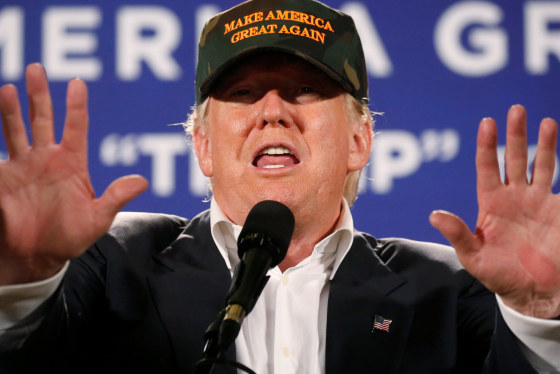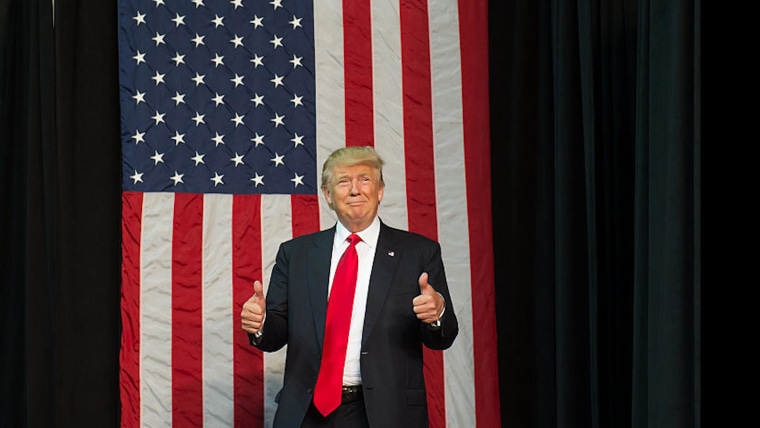LONDON — Big data crunched in a nondescript office more than 3,000 miles from the U.S. might just convince you to cast a ballot for Donald Trump.
In September alone, the Trump campaign paid British firm Cambridge Analytica $5 million to help target voters.
The company says it holds data on 230 million adults across the U.S. — and around 4,000 "data points" on each of them.
Using transaction information from loyalty cards, club and gym memberships and charity donations, it seeks to understand which way an individual might lean politically — and how to potentially change their mind.
"The more you know about someone, the better you can engage with them and the more relevant you can make the communications that you send to them, so our job is to use data to understand audiences," chief executive officer Alexander Nix told NBC News.
None of the data the company collects is, on its own, very intrusive or sensitive, he said.
"This is not health data or financial data or anything that people might feel nervous about, but when you look at the data as a whole, when you aggregate it all, it paints a very interesting picture about the individuals," Nix added.
The information "certainly allows you to begin to understand what interests them, what issues they care about, what ideologies they may have, if it's politics, or what goods and services may be important to them."
In other words, grabbing a sandwich from a preferred café chain, subscribing to a favorite magazine, signing up to a newsletter or even becoming a pet owner are all used to create a profile.
"Citizens have to be told why their personal information is being collected, where it is going to be stored and who it may be shared with."
Meanwhile Democratic nominee Hillary Clinton has kept much of her big data tools in house, relying on top talent to build out her strategy from within.
One of the Clinton campaign's highest-paid staffers is Elan Kriegal, co-founder of the Democratic data firm BlueLabs. Kriegal is on the campaign payroll for roughly $10,000 a month, according to Federal Election Commission reports, adding to the more than $233,000 Clinton paid to his company.
Campaign messaging — whether by the Democrats or Republicans — can be micro-targeted to a voter thanks to all the data collected by different sources.
Nix likens his data and behavioral consulting company's process to the kitchen.
"When you bake a good cake it's the sum of the ingredients ... it's actually flour, and eggs, and ginger, and everything else. And that's what we're looking at," he said. "It's very hard to pull out one data point in isolation and say 'you are that', because that's everything we're trying to get away from."
Insights gained from TV-watching habits and religious affiliations allow psychological attributes to be profiled. And that helps the Donald J Trump for President Campaign decide what to tell you, or not.
In a office featuring a foosball table and filled with computer screens packed with graphs and charts, Cambridge Analytica senior data scientist Eyal Kazin explained how voters are segmented into groups. Some require issue-related persuasion to bring them around to Trump’s agenda, while others are deemed to just need “a nudge” to turn out and vote.
Related: Trump's New App Wants You — and Your Data
In practice, this could reach voters in the form of a social media message about gun ownership, a TV ad about caring for military veterans during your favorite morning show, the scheduling of a rally in your neighborhood or a letter dropped on your doorstep.
Some of the Trump campaign's $5 million spending with the firm in September was used to buy targeted digital and TV advertising space.
Nix argues that such rigorous marketing actually benefits the voter. He says it means Americans receive information about issues that are fundamentally important to them, saving their time.
However, privacy campaigners have raised concerns about such methods.
Daniel Nesbitt, research director of U.K.-based civil liberties activist group Big Brother Watch, said: “Citizens have to be told why their personal information is being collected, where it is going to be stored and who it may be shared with. Without this basic information citizens are going to be left in the dark about what is happening to their personal data and won’t have a proper chance to say, 'no.'”
The Open Rights Group, which is a digital rights protection campaign, called the approach a "disturbing development."
Related:How Trump Spent $8.4 Million to Play Digital Catch-up
Jim Killock, its executive director, said: "American privacy law is completely broken, there is a real sense that you don’t own your own information. It’s putting power into the hands of a small number of companies who know a great deal about people’s beliefs and habits.
He added: "Politicians are relying on this to bring them to power, that makes it very hard for them to challenge these very intrusive profiling tools. What politician is going to constrain the thing that has brought them to political office?”



